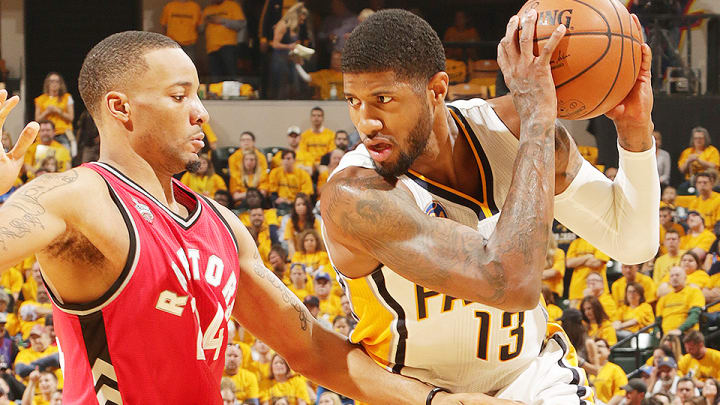Paul George, Pacers force Game 7 as Raptors struggle on offense again

Get all of Jeremy Woo’s columns as soon as they’re published. Download the new Sports Illustrated app (iOS or Android) and personalize your experience by following your favorite teams and SI writers.
Toronto Raptors, meet peak postseason apprehension. After an exhaustive fourth-quarter debacle, more exasperating play from the backcourt that earned this team a lofty (and now suspect) reputation, and a crippling, late 18–0 Pacers run, this series heads back to Canada for a winner-take-all Game 7.
Befuddling as it was, the script was a familiar one. Points off turnovers. Missed opportunities. Most glaringly, another disappearing act from Kyle Lowry and DeMar DeRozan in the 101–83 Pacers win, who combined for 7-of-27 shooting and 18 points on Friday. In turn, the Raptors shot 36% from the floor, with Jonas Valanciunas the only semblance of an offensive fulcrum and a strong showing from key reserve Cory Joseph wasted.
It came on a night where the Pacers looked utterly beatable on their home floor, and for three quarters, they were. There was a fleeting 14–4 Raptors lead, stemming from ball movement, balanced offense and successful jump-shooting, and then a 9–0 Pacers run to end the first. An 8–2 Raptors run started the second, yet at that point, their tenuous grasp felt lost. If they had dictated the pace and kept it steady, prevented a streaky team from making a run and kept Paul George quiet (at halftime, he was just 1-of-6), they were in the clear. On the road, in an elimination game, this proved to be a challenge.
• MORE NBA:Playoff winners and losers | DeRozan’s limitations on display
Even so, Monta Ellis, George Hill, Rodney Stuckey, C.J. Miles and Ty Lawson had totaled just 11 points at the half, shooting 5-of-17 combined. Ian Mahinmi was the Pacers’ leading scorer, and there was a five-minute scoring drought late in the second. Unable to derive offense from jumpers, forcing turnovers and pushing the pace was the Pacers’ best chance. They began the second half with added ball pressure, and, surely enough, that did the trick. Indiana swarmed the rim and the perimeter, deflected passes and tripped up ballhandlers, and the collective effort pushed a shaky Raptors team off a cliff.
Toronto went without a single point from the 1:49 mark of the third to the 7:13 mark of the fourth quarter. There were four turnovers and nine missed shots, with George, Rodney Stuckey and impressive rookie Myles Turner spurring the other side. The train wreck was too massive to look away. Indiana blitzed its way to 21 fast break points and shot 63% in the second half. Toronto opened the game with an 18–6 lead; from there, it was outscored 95–65.
Chalking up an entire series to a few things often reeks of shortsightedness, but when a slump becomes a standard, there’s no avoiding it. DeRozan is shooting 32% for the series. Lowry’s clip is slightly worse, at 31%. It can’t happen again. They carried the Raptors all the way here, and will have to be the ones to lift them out. It’s a historically bad showing from an All-Star backcourt and there are a hundred contexts to make it look worse. This is not to heap overzealous blame, but to call out a narrative that will surely follow any type of Game 7 slip-up.
There are no more surprises from here. The two teams have felt each other all the way out. Any wild adjustments are risks in either direction. This will all take place in front of a home crowd overdue for a playoff triumph, and one that should be duly fed up. It will be intense, win or lose. Nobody should see the Raptors as heavy favorites now, but with a swift, miserable collapse comes every last ounce of the remaining pressure.
